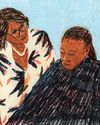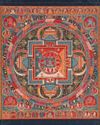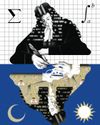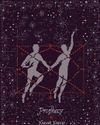
The poet Robin Coste Lewis’s second collection, the exquisite “To the Realization of Perfect Helplessness” (Knopf ), is a book about how the dead do not stay dead. Not only because the author believes, or wants to believe, that she can awaken the deceased with her pen—“I am trying to make the dead clap and shout,” she writes—but because those who are gone are determined not to stay put. Not in the heart, and certainly not in memory.
In a sense, Lewis’s elegiac and haunted volume, filled with both words and photographs, found her long before she conceived it. Twenty-five years ago, Lewis was living in Rhode Island, teaching at Wheaton College and writing fiction. (She had received a B.A. from Hampshire College, where she compared African and South Asian diasporic literature, in 1989, and studied Sanskrit and comparative religious literature at Harvard’s Divinity School, where she earned a master’s degree in 1997.) But she returned home to Los Angeles after the death of her maternal grandmother, Dorothy Mary Coste Thomas Brooks, to empty out her house, which was going to be razed. Under Brooks’s bed, Lewis found a suitcase containing hundreds of photographs—some in black-and-white, some in color, some posed, others candid—that were a record not only of Lewis’s large extended family but of worlds that had vanished, of decisive moments that had come and gone during the Second Great Migration, of which Lewis’s family, which originated in Louisiana, had been a part. It was unclear who had taken the photographs, but, by collecting the images and storing them together in that suitcase, Brooks had created a kind of narrative. It fell to her granddaughter to place it within the larger history of humanity.
Diese Geschichte stammt aus der December 26, 2022-Ausgabe von The New Yorker.
Starten Sie Ihre 7-tägige kostenlose Testversion von Magzter GOLD, um auf Tausende kuratierte Premium-Storys sowie über 8.000 Zeitschriften und Zeitungen zuzugreifen.
Bereits Abonnent ? Anmelden
Diese Geschichte stammt aus der December 26, 2022-Ausgabe von The New Yorker.
Starten Sie Ihre 7-tägige kostenlose Testversion von Magzter GOLD, um auf Tausende kuratierte Premium-Storys sowie über 8.000 Zeitschriften und Zeitungen zuzugreifen.
Bereits Abonnent? Anmelden

MEAN TIME
“Hard Truths.”

ENLIGHTEN ME
The secret beauty of mandalas.

THE BEST OF THEM
His was a genius for the ages. Will Gottfried Leibniz ever get his due?

DEATH CULT
Yukio Mishima’ tortured obsessions were his making—and his unmaking.

Prophecy
The night of Dev’s twenty-second birthday, he was invited to sit with the elders after dinner.

A TALE OF TWO DISTRICTS
Lauren Boebert and Colorado’s red-blue divide.

THE TIKTOK TRAIL
Andean migrants draw others to the U.S. with videos depicting themselves as living the American Dream.

LOVE AND THEFT
Did a best-selling romantasy novelist steal another writer's story?

OUR NEW TWO-FACTOR AUTHENTICATION SYSTEM
Our two-factor authentication system is expanding because text messages and e-mailed codes are becoming less secure. Also, we’re committed to making sure your log-in process is more of a hassle than it needs to be.

STILL PROCESSING
Why is the American diet so deadly?